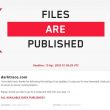The USB drive was found to contain RDX, a military-grade explosive substance that was inside a capsule attached to the drive.
We’ve heard about the Killer USB, which could fry a targeted laptop, but have you heard about a USB that can be used to donate money and physically harm victims? Lenin Artieda, a journalist and presenter at Ecuador’s national television network Ecuavisa, was injured in a pre-planned attack earlier this week.
In a report published by the local TV network Ecuavisa, Artieda received a package containing a USB drive, which exploded when he connected it to his computer to check its contents.
The explosion injured him on his hands and face, indicating that the USB drive was designed to detonate after getting connected to a computer. The incident took place at Ecuavisa’s TV network’s newsroom, where Artieda received the package via mail.
In another report, Ecuavisa revealed that the USB drive was found to contain RDX, a military-grade explosive substance that was inside a capsule attached to the drive. The explosion did not cause any damage inside the newsroom, but Artieda suffered injuries.
Investigation into the incident revealed that only half of the RDX exploded because it was not fully activated, and it is speculated that the device pulled just enough voltage from the USB connector on the PC to make it detonate.
Two other journalists from different media outlets in Ecuador also received similar explosive USB drives, but the drives did not detonate when they were connected to their computers.
Furthermore, reportedly, four more letters containing similar devices were sent to other media outlets across Ecuador, but the targets remained unharmed because they did not open the packages or the devices did not explode.
🛑#ALERTA | @ecuavisa @teleamazonasec y @tctelevision fueron escenario de atentados contra sus periodistas. Fundamedios considera estos ataques gravísimos e inaceptables y hace un llamado a las autoridades para dar con los responsables.
— FUNDAMEDIOS (@FUNDAMEDIOS) March 20, 2023
▶️ https://t.co/6EW0i0VI7H pic.twitter.com/H5cP0iGjds
The police revealed that the device did not explode because it was inserted into an adapter that did not provide the same electrical charge as a computer.
The country’s attorney general has launched a terrorism investigation, as the use of military-grade explosives suggests a possible attempt to intimidate journalists. The attacker’s possible objectives and identity are still unclear, but the government has called it an aggressive act.
“Any attempt to intimidate journalism and freedom of expression is a loathsome action that should be punished with all the rigour of justice,” the government responded.
The incident highlights the danger journalists face when reporting the news and the need for adequate security measures to protect them.










